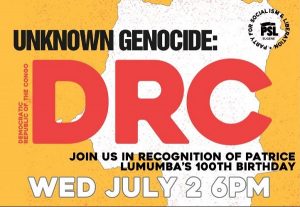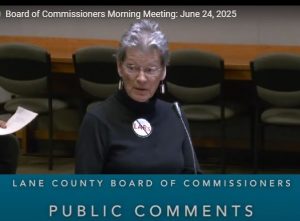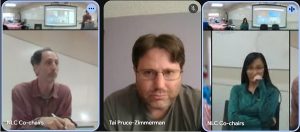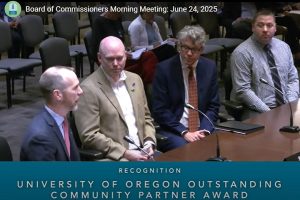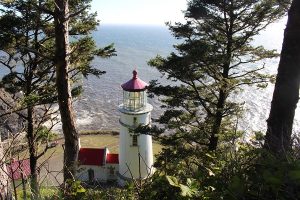Rep. DeFazio takes a victory lap in Orlando
5 min read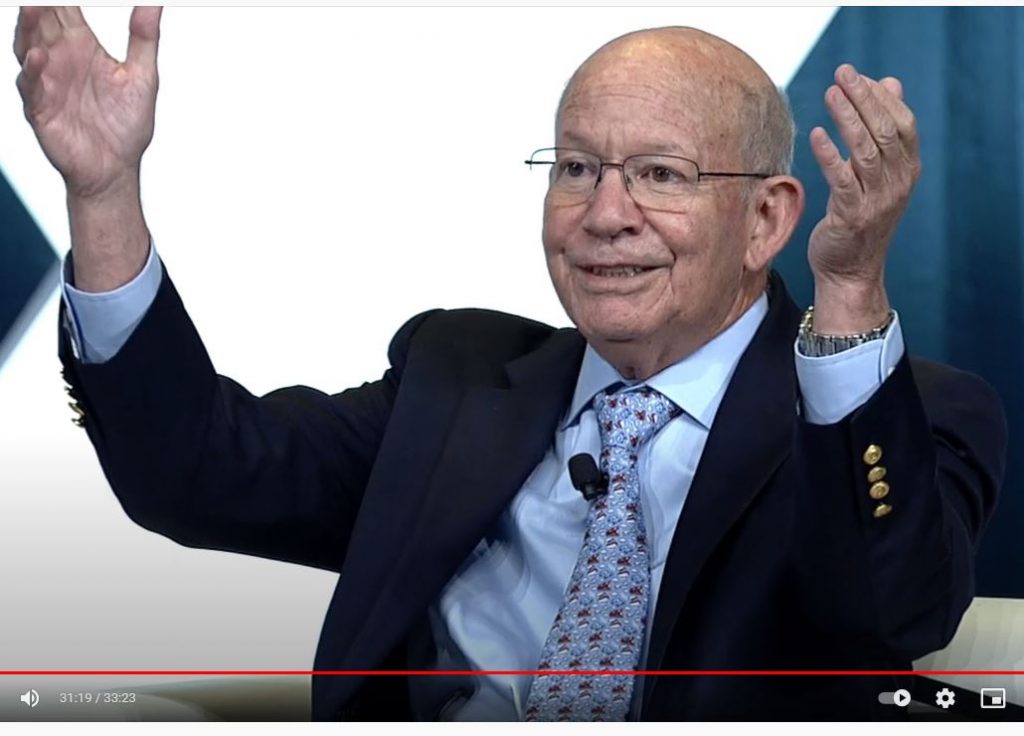
Representative Peter DeFazio is going out on top. He took a victory lap at a national transit conference in Orlando.
[00:00:07] Dorval Carter, Chair, APTA Legislative Committee: My name is Dorval Carter, the president of the Chicago Transit Authority. It is my distinct pleasure to welcome the Chairman of the Transportation and Infrastructure Committee, Peter DeFazio, to our conference. Well, Mr. Chairman, you talked about the bipartisan infrastructure bill, what elements of the bipartisan bill are most important to you?
[00:00:38] Rep. Peter DeFazio: Well, the number one thing is the funding levels. … . You know, America has under-invested in transit for years. The most important thing is the record level of spending.
[00:00:51] But it’s not the only part. We need to pair increased funding with the right policy choices. That includes an emphasis on the conversion to zero emission fleets or rejection of continued efforts by Big Oil to secure subsidies, to prop up a dying industry that’s killing the planet. That means a focus on equity, not as an afterthought, not to check a box, but a meaningful improvement in access and quality of life for all Americans.
Thank you for supporting
local citizen journalism
That means a recognition that every transportation decision is also a climate decision, a decision about how to prevent, mitigate the catastrophic events of climate change we’re already seeing today. And that’s why it’s so essential that we pass the Build Back Better Act. It’s not the total solution. But it is a big step toward the policies that will help us build a better future.
[00:01:45] The bill includes $10 billion for transit through a new affordable housing access program. This is novel. This would provide expanded transit service and funds to be administered jointly by the Federal Transit Administration and Department of Housing and Urban Development, a unique approach we’ve never taken before in authorizing a transit program. That partnership will ensure that selected projects will expand access to affordable housing, education opportunities, and meaningful employment.
[00:02:17] The program has focused on disadvantaged communities, low-income neighborhoods, persistent poverty communities who often have the residents most in need of transit service and access to affordable housing. But they’re too often left behind when route and planning service decisions are made.
[00:02:34] Funds will go to: build new bus lines, rail lines, expand transit service to areas that don’t have it now; increase the frequency of service; purchase zero emission buses; rebuild transit facilities; support research development workforce training. Unlike traditional funds, these funds will be available to cover operating costs in addition to capital expenses. They’ll also be available up to a 100% federal share, which will allow us to deliver projects more quickly.
[00:03:04] Transportation that has long been one of the more bipartisan issues in Congress, but that hasn’t always held true when it comes to transit. Some members still hold the outdated view that transit’s a luxury rather than a necessity or that transit is only important for the big cities that they don’t represent. Nothing could be further from the truth. Transit is a lifeblood of ours. But it’s also a lifeline for our small towns. All of America, rural Americans deserve to have mobility options. Small-city residents deserve to have mobility options and clean air just as much as those in our big cities. And while transit operations in rural communities may look different than transit in major cities, it doesn’t make it less valuable for those who depend on it.
[00:03:48] I got on the floor for a while with the suppliers here today. What I saw out there was advanced transit technology, made in America… We’re sending a signal. There’s going to be a lot of business for you. If you’re going to make major capital investments, build plants, you’ve got to know that the business is coming. Well, the business is now coming. We’re putting up the money, the business is now coming.
[00:04:16] I’d like to encourage you all to keep innovating for the future. As transit ridership begins to grow, now is the right time to rethink service routes, frequency to ensure systems are ready to meet today’s and tomorrow’s challenges. We’re seeing great examples across the industry.
[00:04:31] Champaign-Urbana, not only launching hydrogen buses, but is producing their own green hydrogen using solar power. That’s incredibly exciting.
[00:04:44] It includes WETA (Water Emergency Transportation Authority) in San Francisco who testified before our committee in September that their ferry ridership nearly doubled overnight after they reduced fares and provided better service to working-class communities. They rethought their business model and it’s provided tremendous benefits.
[00:05:03] Kansas City, where they launched a zero emission and zero fare service helping to tackle climate and equity concerns together.
[00:05:11] The path forward is going to look different at every one of your agencies, that’s for certain, but it’s incumbent on all of us to be bold in confronting the challenges we face: the threat of climate change, the need to build a more just and equitable society, the need to support reliable family wage jobs for our workers. Transit has a central role to play in meeting all of those challenges.
[00:05:39] John Q: He also told how Eugene came to have the DeFazio Bridge.
[00:05:43] Rep. Peter DeFazio: Quick story. My first term in Congress, Ronald Reagan had vetoed the surface bill, I was the most junior member of the committee. I went to Bob Roe and said, you know, ‘Could I get something in this bill?’ And he sent me, I can’t remember, he had this, his chief of staff was a very intimidating guy, Sullivan I think his name was, gigantic guy. And he was like, ‘Oh, I guess you can do that. That’d be okay.’ So I got some money for a project. I knew that it was stalled because it was a joint city / county / state project to do at least the design and work on that. And I remember the consultants were in Eugene, saying, ‘Oh, you’re going to be a hero.’ I said, ‘No, you don’t know Eugene.’ I said, this will become controversial. Ultimately it did. They proposed the six lane bridge in Eugene. They had to have a referendum. They voted that down. So ultimately they built the bridge. They did the earthquake reinforcement.
[00:06:36] They did improve traffic throughput with on-ramps off-ramps safety for bicycles. But they, then they had money left over because I’d gotten the more money for the bigger bridge. And so they built a bike bridge next to it, which they named after me. So anyway, that’s how these things work out sometimes.
[00:06:56] Dorval Carter, Chair, APTA Legislative Committee: Thank you, Chairman DeFazio. We greatly appreciate you and your time today. And I’d like for us all to give the Chairman another huge round of applause for his support in transit. Thank you so much.
[00:07:13] Rep. Peter DeFazio: Thank you.
[00:07:14] John Q: Rep. Peter DeFazio, shortly before announcing that he would not seek a 19th term. In his statement, he thanked his wife Myrnie Daut, “whose strength, encouragement, and counsel has made my career possible.”
